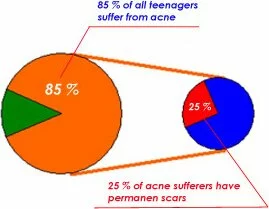
Many grown-ups are in the habit of claiming that adolescence is the best time in your life: you are big enough to do a lot of adult things, at the same time being not burdened with earning money, taking care of family and kids, and other responsibilities. It is all true, but Teenage life is also full of problems and stresses: struggling with grades, trying to be cool enough to enter the best school company, love affairs and envious friends Besides, it is necessary to remember that these are the best years of your life and you should enjoy them!
Oh, yes, there is one more problem, able to spoil the happiest living of any teenager: it is acne. Statistically about 85-90% of all teens experience those freaky zits. If they seem to be only pimples on the skin surface, they may be the reason for a terrible depression and low self-esteem deep inside the sole of any teenager. Some suffer from them so much that they even do not want to go out of their houses, preferring loneliness to the scoffing glances of the luckier friends: appearance is always very important, no matter how old you are!
What is teen acne? It is a condition, which manifests itself through the development of pimples (zits), which are, actually, clogged, swollen pores in the skin.
It is a condition, which manifests itself through the development of pimples (zits), which are, actually, clogged, swollen pores in the skin.
When does it happen? Most often acne strikes teens between the ages of ten and thirteen. However, many adolescents may notice the first pimples at fifteen or seventeen.
Why does it develop? At the onset of puberty many essential changes take place in the body of a teenager, preparing a person for the adult life. Hormonal changes are, perhaps, the most important and significant. A body begins to produce male hormones androgens, which stimulate the activity of the sebaceous glands pores in the skin, called to create oil (sebum) in order to keep skin smooth and soft. However, androgens provoke over activation of the pores, resulting in the production of the excessive oil.
On the other hand, the top layer of the skin is constantly renewed by flaking the dead cells off. This process is also more active during puberty. Excessive oil and too many shed cells easily mix together, forming a sticky mass, which often clogs the pores. Therefore, oil, the production of which never stops, shed cells, and bacteria, always present on the skin surface, become trapped inside the pore and cause its swelling and inflammation. White blood cells rush there to put the inflammation down and also get stuck in the pore. The process usually takes 2-3 weeks and results in the development of a pimple.
Who is more likely to experience acne? Scientists suggest that heredity may play a role in the development of this skin condition. Therefore, a person is at a greater risk of having teenage acne if his/her parents suffered from it.
Sex prevalence Both boys and girls may have acne. Girls experience its breakouts during their periods due to the hormonal imbalances. However, boys have higher levels of androgens and produce more oil; that is why their skin is more often and severely attacked by this condition.
How long will teen acne last? This condition is in the habit of subsiding by itself in 5-10 years. Rarely it lasts till a person is 25. However, many people may experience acne much longer, sometimes throughout their lives.
Acne treatment. Mild and moderate teenage acne may successfully be treated with over-the-counter medications. In more severe cases it is better to consult a doctor to define, which drug is the most appropriate for the particular person. The table below shows the statistics on what people choose to treat their acne.
Possible acne triggers. Using makeup, suntan or hair products that contain oil, as well as skin products containing alcohol may provoke acne outbreak. Trying to get rid of pimples, some teenagers pick, squeeze or scrub their skin hard, being unaware that all this will worsen the condition. Furthermore, these manipulations may result in forming of permanent scars. Sun exposure is not recommended either, since it causes faster skin cells shedding, thus giving additional chances for the pores to get clogged.

No doubt, acne may lead to stress and depression, but it is better to try hard to control and avoid these feelings, because they are said to aggravate the condition.
What does not cause acne? Unlike the triggers described above, such things as dirt, fatty foods, sexual activity or masturbation do not cause acne. It is scientifically proved that they belong to myths rather than to acne causes and triggers. Finally, it is worthy to remind that everything has its advantages. In case of acne, the advantage is that this condition is one of the signs of the adult life beginning.
Ivanna
| Tip for you : Sign-in with Your OpenID and post faster, easier and with easy access to all your past posts. | |
|
Your Nick: |















